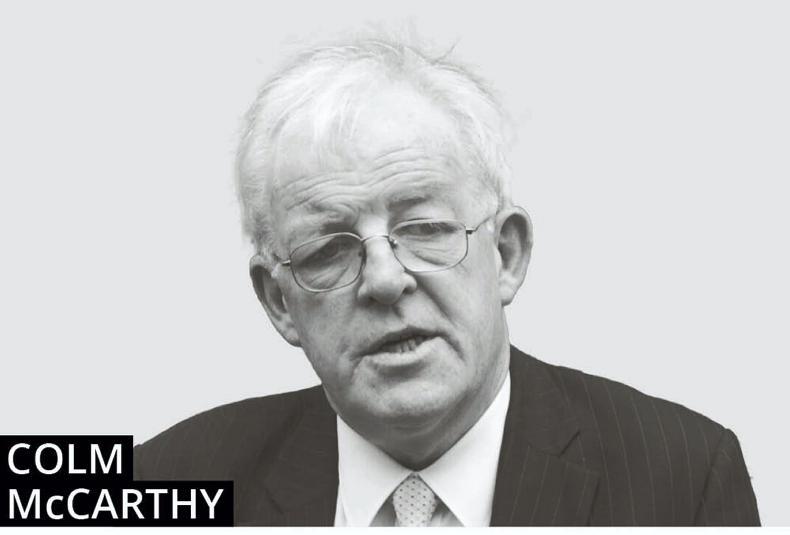If all goes well, exit from lockdown and ultimately from all the restrictions that have crippled economic activity should become possible as the year progresses.
The Government will then need to address the strain on the Exchequer, which has expanded national debt dramatically through 2020 and 2021 to-date.
At the end of 2019, Ireland’s state debt was around €200bn, and the plan was to let it rise no further. It will have risen towards €250bn by the end of next year.
The €350 per week Pandemic Unemployment Payment (PUP), the wage subsidy schemes, VAT reductions and the direct supports for businesses have expanded borrowing to unsustainable levels, as have similar interventions elsewhere in Europe.
The restrictive measures keeping people out of work and businesses closed cannot responsibly be lifted too soon and it would be a surprise if they are all gone by year’s end
Opposition parties, including Sinn Féin and People Before Profit, have been demanding that Government announce the extension of these schemes beyond their intended termination at the end of June, and it is surprising that their extension has yet to be formally announced.
It is bound to happen, as the Government must realise. The restrictive measures keeping people out of work and businesses closed cannot responsibly be lifted too soon and it would be a surprise if they are all gone by year’s end. Even then, there will be quite a job getting viable firms solvent and there will likely be another large deficit in 2022.
In demanding that deficits continue for now, and that there be no abrupt withdrawal of emergency supports, the opposition parties are in unfamiliar, and possibly embarrassing, company. Identical recommendations have issued recently from the European Central Bank (ECB) in Frankfurt and the International Monetary Fund (IMF) in Washington. Both the ECB and the IMF understand that wartime finance is unavoidable, which means running deficits and selling bonds to the central bank.
Several other European countries had bank busts too, but the Irish blowout was exceptional and followed a period of national hubris and out-of-control public spending
The sustainability issues should be addressed when the war is over. Unlikely wartime alliances rarely survive into peacetime, and the embrace of macroeconomic orthodoxy by the Irish left is a coincidence.
The position of Ireland in all of this is quite unlike the situation after the financial crash of 2008. Ireland managed to engineer the biggest banking bust, relative to the size of the economy, anywhere in the developed world in modern times.
Several other European countries had bank busts too, but the Irish blowout was exceptional and followed a period of national hubris and out-of-control public spending.
There was little sympathy in Europe, and this mattered, since Ireland had abolished its currency a decade earlier, adopting the euro instead. This meant that the authorities could not just create euros and lend them to itself.
The Irish Exchequer could not turn to the Irish central bank for emergency funding and could spend only what could be borrowed on the open market. This turned out to be zilch by the summer of 2010 and the country was forced into a sharper cutback in state borrowing than would have been desirable.
Whatever course the virus takes, there is no reason to expect ECB policy to select Ireland for special punishment
There was no sympathy on offer from the ECB, which handled the overall Eurozone crisis poorly under Jean Claude Trichet’s leadership and did no favours to Ireland. There will be no differential treatment this time around, mainly because everyone is in the same boat.
Every country in the Eurozone has had to borrow heavily and Ireland has done no worse than others in fighting the pandemic. The ECB has learned lessons too and there have been important reforms. Whatever course the virus takes, there is no reason to expect ECB policy to select Ireland for special punishment.
But mistakes have been made in Ireland that could prove costly, notably the rapid expansion in public spending on items quite unrelated to the COVID-19 emergency, which will make the post-crisis return to sound finance more difficult. The lifting of fiscal restraint because of the ECB’s accommodative policy has created the opportunity for politicians to indulge their short-term instincts, and commitments have been undertaken, to the tune of about €5bn per annum, to new long-term spending during 2020 for which no permanent revenue sources have been identified.
There will be a reckoning in due course. The European Commission, post-pandemic, will re-impose the agreed limits on budget deficits and the ECB will cease buying Government debt. Interest rates will drift upwards, especially for the more indebted national treasuries, as the bill comes due. ‘Who is going to pay for all this’ has become a constant, nervous query.
If the vaccination programmes deliver, the European economies should be over the worst sometime next year, but rapid recovery is not automatic. The IMF and the ECB are aware that the COVID-19 downturn is a bigger blow to the world economy than the financial crash 10 years earlier, and that it will take longer to fix.
Best not to rush the return to balanced budgets and to caution from central banks.









SHARING OPTIONS